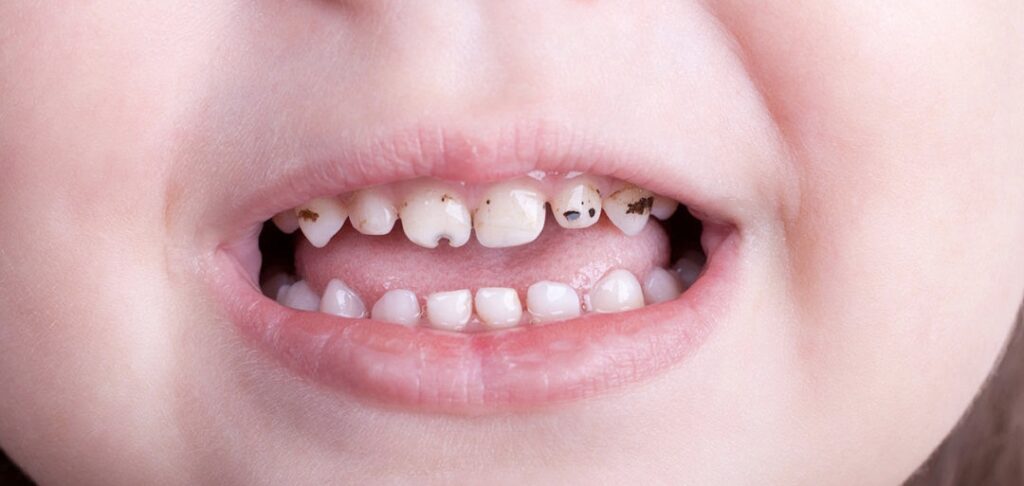Baby bottle tooth decay is the most prevalent dental problem affecting babies. This form of tooth decay commonly occurs due to prolonged contact with sugar that may erode the enamel layer of the upper anterior teeth.
The Bristol, Connecticut dentist and their team of pediatric dentists offer a variety of procedures that can help treat baby bottle tooth decay. Read on to learn the causes, symptoms, treatment, and prevention of baby bottle tooth decay.
| Baby bottle tooth decay, also known as infant caries, early childhood caries, and nursing bottle caries, is an aggressive form of tooth decay affecting mostly infants, and toddlers. It usually occurs in the front teeth, or incisors. |
Causes of baby bottle tooth decay
Baby bottle tooth decay occurs when infants’ teeth are exposed to excessive sugar, promoting bacterial growth in the mouth. These bacteria metabolize sugar, generating acids that erode tooth enamel, leading to decay. Babies who breastfeed or bottle-feed to sleep, especially with milk or sugary liquids, are at increased risk of developing this condition known as nursing bottle caries.
Symptoms associated with baby bottle tooth decay
You can expect the following signs and symptoms in baby bottle tooth decay:
- White spots, especially on the upper front teeth (maxillary incisors)
- Pain and discomfort
- Increased tooth sensitivity
- Prominent deep cavities
- Tooth discoloration (dark brown or black)
- Swelling around the affected teeth
- Bad breath
- Extreme irritability
- Tooth erosion
- Tooth loss
Treatment for baby bottle tooth decay
Baby bottle tooth decay can be reversed and effectively treated through the following:
- Fluoride treatment
- Dental sealants
- Dental fillings such as amalgam or GIC
- Pulptomy (removal of coronal pulp) or pulpectomy (removal of radicular pulp) with a stainless steel crown
- Extraction for severe cases with space maintainers until permanent teeth erupt
Preventive tips for baby bottle tooth decay
It is possible to prevent infant or baby bottle tooth decay through the following preventive measures:
- Don’t put your baby to sleep with a milk bottle
- Avoid giving them excess fruit juices or sugary items like candy or lollipop
- Clean their gums with a wet gauze after every feed
- Brush their teeth once they erupt, twice daily
- Use a soft-bristled toothbrush and low-dose fluoride toothpaste to brush their teeth
- Transition to a sippy cup as soon as possible
- Encourage healthy eating habits in them
- Hydrate them well to increase saliva production and flush out the toxins
- Take your baby to the dentist once in six months for checkups
Minimizing sugar consumption, promoting nutritious foods, ensuring proper hydration, and encouraging regular brushing to prevent or address baby bottle tooth decay is crucial. Consult your dentist if your baby suffers from white spots or other signs of infant caries. Early detection and treatment can safeguard the integrity of primary dentition.
About Author
You may also like
-
CBT Coaching for Anxiety: Empowering Change Through Thought and Action
-
Why Diabetic Retinopathy Screening Shouldn’t Be Ignored
-
Top Medical Transcription Software for Accurate Healthcare Documentation
-
Targeted Solutions for Every Skin Concern: From Acne Scar Treatment to Botox Treatment Singapore
-
The Science Behind Drinkable Collagen: What Studies Really Say


